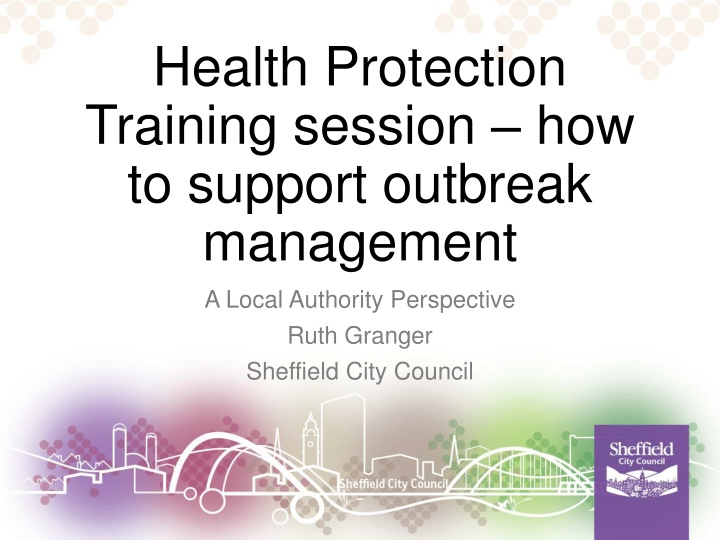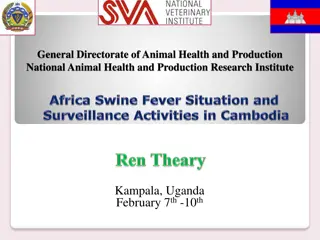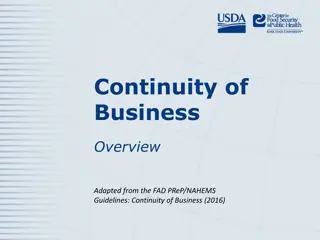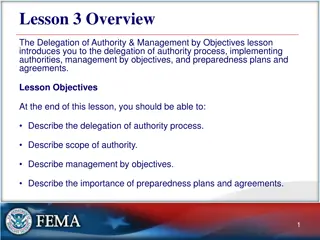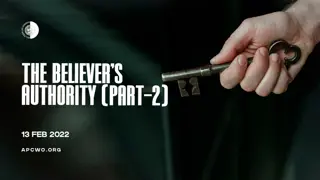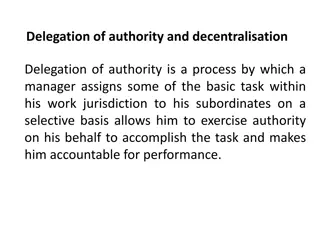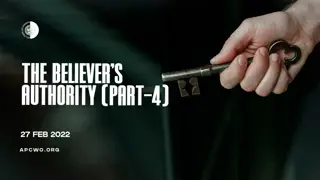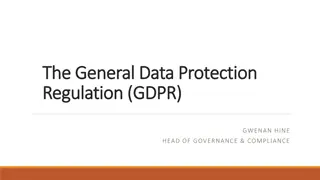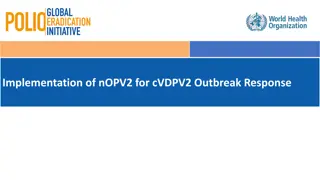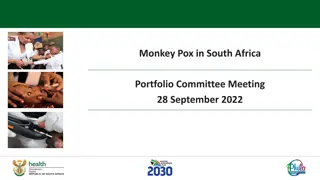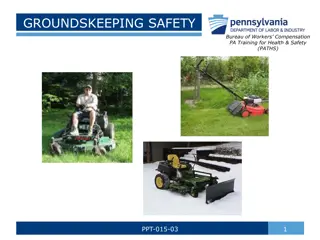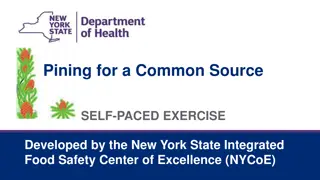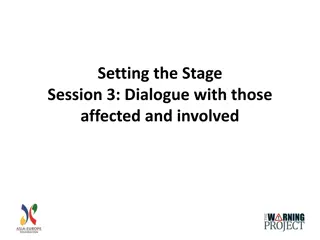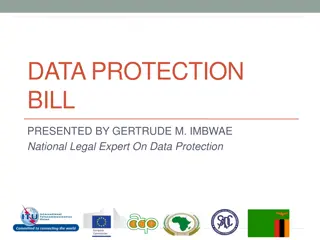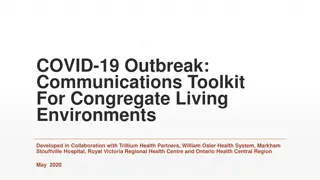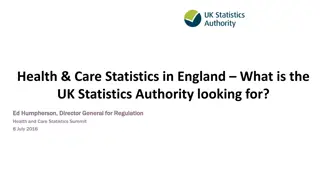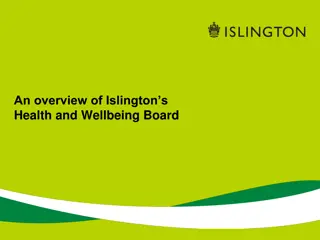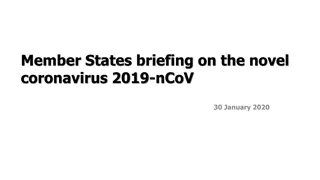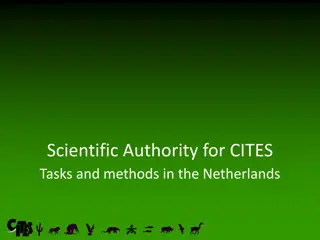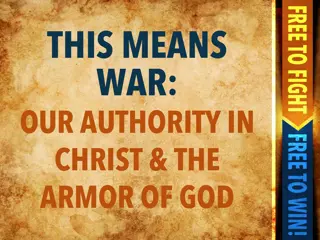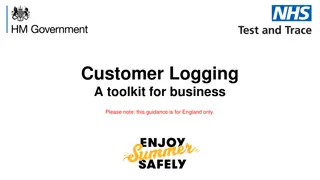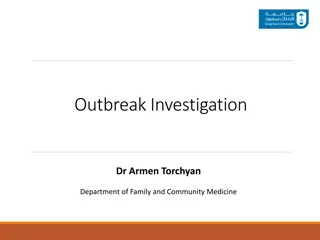Health Protection Training for Outbreak Management: A Local Authority Perspective
This training session, led by Ruth Granger from Sheffield City Council, focuses on supporting outbreak management from a local authority perspective. Participants will learn about the importance of health protection, the role of the Public Health representative in outbreak control teams, and the key objectives of outbreak management to safeguard public health. The session covers various topics related to outbreak control, encourages active participation, and aims to equip attendees with practical knowledge and insights.
Download Presentation

Please find below an Image/Link to download the presentation.
The content on the website is provided AS IS for your information and personal use only. It may not be sold, licensed, or shared on other websites without obtaining consent from the author.If you encounter any issues during the download, it is possible that the publisher has removed the file from their server.
You are allowed to download the files provided on this website for personal or commercial use, subject to the condition that they are used lawfully. All files are the property of their respective owners.
The content on the website is provided AS IS for your information and personal use only. It may not be sold, licensed, or shared on other websites without obtaining consent from the author.
E N D
Presentation Transcript
Health Protection Training session how to support outbreak management A Local Authority Perspective Ruth Granger Sheffield City Council
How this training is going to work Slides on a range of topics relating to outbreak management and associated issues Pauses in various places to give opportunities for comments/questions How to raise comments/questions This is brand new for many people and this training is brand new questions are very welcome!
Why are we doing this training? Covid 19 response is now at the stage where its being treated as a pandemic made up of a number of local outbreaks We need to support PHE with their outbreak management work In normal time we sit on outbreak management groups with PHE We need more capacity to be able to do more of it It s a great opportunity to learn about health protection!
Before we start Write down how you feel about this training Your potential role in outbreak management (you will not be asked to share this) Write down some things you hope this training will include (I will ask you to share this)
Learning objectives Learn about how to be the Local Authority Public Health representative on a covid-19 outbreak control team. Learn more about what outbreak management/outbreak control is Outline some basic concepts to help you understand what s going on To consider some standard agendas etc and examples Insight/perspectives into local authority role on Outbreak Control team/outbreak management team Explain what your role is and isnt Give you some practical information about what this might mean for you
What is the point of outbreak management? The primary objective in outbreak management is to protect public health by identifying the source and implementing control measures to prevent further spread or recurrence of the infection. Communicable Disease Outbreak Management operational guidance (PHE 2014) Adopted by Sheffield Health Protection Committee in 2015 PROTECT PUBLIC, PREVENT SPREAD
Section 1 what is outbreak management? Will you please decide what you want to call it! Outbreak management Outbreak control Incident management Don t PHE usually do this? Yes CCDC or Consultant in Health Protection usually lead this The ARC Acute Response Centre usually lead this BUT our local role is to support and augment PHE Add Local expertise and potentially local resource Add capacity
Actually what is an outbreak in the context of covid-19? An outbreak or incident may be defined as: an incident in which two or more people experiencing covid-19 are linked in time or place a greater than expected rate of infection compared with the usual background rate for the place and time where the outbreak has occurred a single case for certain settings (care homes) PHE outbreak management guidance section 4.1 For covid-19 we are likely to have a number of smaller outbreaks
How to Manage an Outbreak Emigrate Take annual leave, and let someone else do it When all else fails - call an Incident Team meeting, and share the workload! According to Rosy McNaught legendary Consultant in Communicable Disease Control (CCDC)
Role of the OCT To assess what we know so far To assess what we still don t know To decide how to find out what we don t know To decide who will do the finding out To determine the control strategies To manage the communication and media issues To determine the resources that will be needed To evaluate the control measures taken To declare the outbreak over To undertake a structured debrief at the end To report back to the Board?
Membership of OCT Consultant in Communicable Disease Control/Health Protection or Consultant Epidemiologist Consultant PHE Microbiologist Communications officer Director of Public Health (or nominated deputy) Field Epidemiology Service Consultant Epidemiologist Environmental Health Officer (EHO) Administrative support
Whos who partnership work Public Health England (expertise) Environmental Health (investigative and legal powers) Health and Safety Executive Director of Public Health (governance/oversight) Primary and secondary care (delivery) Infection Prevention and Control (prevention, reaction to outbreaks) Workplaces, schools, voluntary sector (where it happens!)
Questions and comments so far Type into the chat function of zoom put question or comment then type what you want to say
2. Some basic concepts What you can expect to be on your Outbreak control team bingo card
What do you talk about in an Outbreak control meeting? Investigations Epidemiological remember an outbreak is cases linked by person, time or place Microbiological Environmental veterinary Control measures there s a long list of potentials unfortunately not many apply to Covid-19 Communications communication IS the incident
Arg! Theres technical terms everywhere! Investigations - microbiological PCR it s a test, don t need to understand it just ask for clarification of what the result means Try not to get too overwhelmed. AND crucial thing to remember no test is 100% accurate False positives test says you have it and you don t False negative test says you don t have it and you do Important in context of Covid-19 and recommendation to isolate Case definition what counts as a case and what counts as a contact? Testing positive? Having symptoms? Having heard on Facebook that they have a cough? Index case the first person to have the infection other people are linked to the index case
Control measures How to prevent further cases Kill or inactivate the agent at SOURCE Antibiotics no Decontamination, Disinfection, Sterilization yes Heat treatment no Treating the index case no Protect the host - the RECEPTOR Isolation yes Immunisation no Chemoprophylaxis no Interrupt the PATHWAY of transmission Isolation yes Environmental hygiene yes Personal hygiene yes Personal Protective Equipment yes
Communications Communication IS the incident Inconsistent communication can become the incident .. Be consistent within and across organisations Please remember confidentiality Please remember wider impacts I heard that a nurse at STH has covid-19, I m having a heart attack but I m still not going to STH 10 years ago that shop had a case of covid-19 I m never going there again Remember that there is always the potential for legal action or FOI Who can help you? SCC comms and PHE comms and setting/partner comms The guidance (although ..)
So what about contact tracing? Contact tracing is a tool in outbreak management Contact tracing is a way of identifying people who might have been infected and asking them to isolate sooner than they would have otherwise done to reduce opportunities for transmission Only works if people actually isolate . National programme of track and trace Locally working to support and augment national programme
3. risk Outbreak control is all about risk management Balancing risk is a key part of health protection Some of it comes with practice . This isn t a perfect world -sometimes its least bad and doing your best options
PHE risk assessment framework (for information not memorisation!) 5 dimensions all measured 0-4 with 4 being bad Severity - potential to cause harm (4=severe illness almost inevitably fatal rabies) Confidence/uncertainty =diagnosis correct? (4=hunch) Spread likelihood of spread (4 is measles in an unvaccinated population) Intervention feasibility to alter course of event and reduce transmission * Context- broader environment both political and public opinion, mood You don t need to remember this or even lead the risk assessment its on page 39-41 of the outbreak management guidance for your information.
What Ive learnt about risk Perceptions of risk vs actual risk Risk perception isn t logical Schools, parents and children perception high risk ..actuality mainly low risk People living in homeless hostel perception a risk they are willing to take .actuality higher risk Sometimes you re trying to reduce perceptions of high risk sometimes you re trying to increase them!
4. The local authority role and the roles and responsibilities of others Normal world Covid-19 world
Normal world - Whats the (statutory) role of the DPH To be assured about the safe and efficient running of systems to protect the health of the population including Communicable (infectious) disease Infection prevention and control - the public health grant contributes financially to half of the IPC team at the CCG
.And in the covid-19 world Its all hands to the pump . Locally we have to support and augment PHE and the national contact tracing process Because Its our population We have local insights to add that can help it work better Its about inequality
What Ive learnt - inequality PHE Health Profile for England (2018): Threats to health are not equally shared. the impoverished Incarcerated Institutionalised Homeless Are at far higher risk of illness and premature mortality than the general population
5. Your role and how we can support you in it We will talk about what this practically will mean as well as what we are and are not asking you to do
What are we NOT asking you to do Feel responsible for people getting covid-19 (its an infectious disease! We can t altogether control it!) Suddenly know everything about infectious diseases, infection prevention and control or how contact tracing works Chair an outbreak control team meeting tomorrow Be left on your own on a Saturday afternoon with no one to help you
What are we asking you to do Not panic Represent SCC on the outbreak control team after you ve shadowed someone else Ask if other people can also join the OCT I think someone from the care homes team would be helpful can I invite the commissioner of hostels please Ask sensible questions and feed in your local knowledge err do you know that s a council building? hmm actually I think that might be a special school Actually there are some community tensions in that area You re assessing how you and local authority colleagues could be helpful actually we have some community workers in that area our voluntary sector partners have good relationships with that community I m not sure how we can help, I will find out Your considering whether Local Authority or Sheffield system resource could aid the response eg support with testing? Comms support? Relationship support?
Some traps to avoid Be clear on your role Often you re not the commissioner You re not the expert health protection advice You re not expected to be a microbiologist! Confidentiality only people who need to know need to know and unlikely you need to know name of index case Remember reputational risk for you and other organisations that school had a teacher with covid-19 I m not sending my children there Anxiety . You can t control all of it! Its an infectious disease! Competent management by the system is what you re aiming for. Be helpful and make connections. And learning lessons and improving
So whats next? Have a read of the PHE guidance Take some practical steps to get set up ask me any questions you feel are unanswered Shadow me (or someone else at an OCT) Be the local authority representative on an OCT yourself!
So is this really going to happen? Yes it really probably is.. PHE have asked us how they can inform us and get an OCT up and running 7 days a week More capacity to support this will mean we can contribute our local knowledge more effectively plus an outbreak might happen in a setting or population group you have expertise in
What practically does this mean? We have an inbox for PHE to inform us of outbreaks where they may Ask us to join an OCT Ask us for help Its currently 9-5 Monday to Friday It needs to move to 9-5, 7 days a week We are also getting a phone line in case outlook crashes (but that never happens ) Doing this in a buddy system way will probably be a good place to start
Arg! Are you going to ask me to work on Sundays? It is not compulsory to go on this rota We will need to have a rota and cover it, soon 7 days a week We are talking to Scott in HR about the possibilities with this (eg work a whole day and take one back, just check emails and take hours back etc etc) some of the possibilities depend on your contract T&Cs We will be as flexible as we can We will get back to you when we know more!
What practically do you need to do ? Get added to the sheffieldLOCT@sheffield.gov.uk email inbox Go on training (15 mins ) to access the special phone line Feed into requests about the rota when they come
Summary of what we have talked about today We have a role in contributing to reducing the spread of Covid-19 We can make outbreak management more effective for Sheffield by bringing our local knowledge and relationships Outbreak management at its simplest is about bringing the right people together to manage a situation
Questions comments Go back to what you wrote down at the beginning Have we answered your factual questions? Have we helped at all with how you feel?
